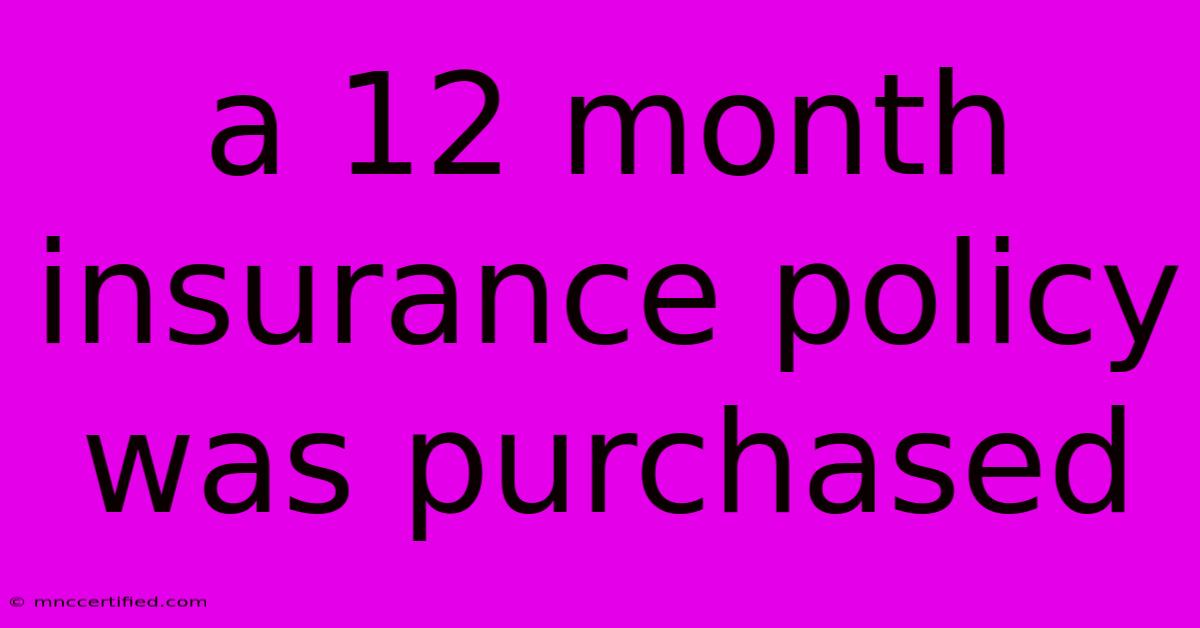A 12 Month Insurance Policy Was Purchased

Table of Contents
Understanding Your 12-Month Insurance Policy: What You Need to Know
Congratulations! You've taken a proactive step towards protecting yourself and your assets by purchasing a 12-month insurance policy. Now that you've secured this crucial coverage, it's important to understand the details and benefits of your policy. This guide will help you navigate your policy and ensure you're fully informed about its key aspects.
The Power of a 12-Month Policy:
Choosing a 12-month insurance policy offers several advantages over shorter-term options:
- Cost Savings: You'll likely secure a lower overall premium when you commit to a longer-term policy. Insurance companies often offer discounts for multi-year commitments.
- Peace of Mind: Knowing you're covered for a full year provides a sense of security and eliminates the hassle of renewing your policy frequently.
- Stability and Predictability: You'll have a fixed premium for the entire year, making it easier to budget and manage your finances.
Key Elements of Your 12-Month Insurance Policy:
Your policy document will include a variety of information, but here are some essential elements to pay close attention to:
- Policy Period: Clearly states the start and end dates of your coverage.
- Coverage Details: Outlines the specific risks your policy protects you against, including:
- Liability Coverage: Covers legal expenses if you are held liable for damages to others.
- Property Coverage: Protects your belongings from damage or theft.
- Medical Coverage: Offers protection against medical expenses resulting from covered incidents.
- Deductible: The amount you are responsible for paying out-of-pocket before your insurance kicks in.
- Premium: The amount you pay for your policy, typically paid in installments or a lump sum.
- Exclusions: Specific situations or events that are not covered by your policy.
What Happens After 12 Months?
Once your 12-month policy period ends, you have several options:
- Renewal: Your insurance company may automatically renew your policy for another term, often at a new premium rate.
- Cancellation: You can choose to cancel your policy before the end of the term, although you may be subject to penalties.
- Switching Policies: You can explore other insurance providers and compare their offerings to find a better deal.
Staying Informed and Maintaining Coverage:
To ensure your policy remains active and meets your needs, consider the following:
- Review Your Policy Regularly: Check for any updates, changes in coverage, or potential gaps in your protection.
- Notify Your Insurer of Changes: Inform them of any significant events such as a change of address, property improvements, or an increase in your assets.
- Stay Organized: Keep all policy documents, receipts, and communication records readily accessible.
Seek Professional Guidance:
If you have any questions or need clarification about your 12-month insurance policy, don't hesitate to contact your insurance agent or broker. They can provide personalized guidance and support to ensure you fully understand and benefit from your coverage.
Optimizing Your Policy:
To maximize your insurance benefits and secure the best possible value, consider these tips:
- Shop Around: Compare quotes from different insurers before settling on a policy.
- Increase Your Deductible: A higher deductible may lead to lower premiums, but be sure you can afford it in the event of a claim.
- Bundle Policies: If you need multiple types of insurance (e.g., home, auto, life), consider bundling them with the same insurer for potential discounts.
By taking the time to understand your 12-month insurance policy, you can ensure you are adequately protected and prepared for any unforeseen circumstances. Remember, insurance is a valuable investment in your financial well-being, and being informed about your coverage will give you the peace of mind you deserve.

Thank you for visiting our website wich cover about A 12 Month Insurance Policy Was Purchased. We hope the information provided has been useful to you. Feel free to contact us if you have any questions or need further assistance. See you next time and dont miss to bookmark.
Featured Posts
-
3303 Sw Bond Avenue Portland Oregon 97239
Nov 07, 2024
-
Barcelona Predicted Xi Champions League Match Vs Crvena Zvezda
Nov 07, 2024
-
Bloomington Votes To Keep Ranked Choice Voting
Nov 07, 2024
-
Washington Lieutenant Governor Race Results 2024
Nov 07, 2024
-
Bitcoin Price Jumps After Trump Tweet
Nov 07, 2024